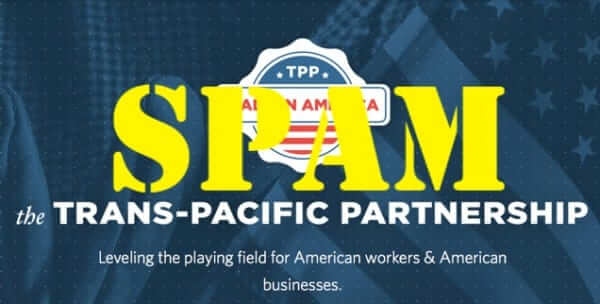
The Trans-Pacific Partnership (TPP) is a trade agreement between the United States, Canada, Japan, Mexico, Australia, New Zealand, Singapore, Brunei, Vietnam, Malaysia, Chile, and Peru. At its heart, the TPP is intended to make trade between these and other Pacific Rim countries who may sign on to the TPP easier. What is interesting, and what many don’t realize, is that the TPP has an anti-spam section that deals with electronic commerce and spam. Sort of.
Chapter 14 of the TPP, titled “Electronic Commerce”, reads as follows, in the part addressing spam:
CHAPTER 14 ELECTRONIC COMMERCE
Article 14.14: Unsolicited Commercial Electronic Messages
1. Each Party shall adopt or maintain measures regarding unsolicited commercial electronic messages that:
The Internet Patrol is completely free, and reader-supported. Your tips via CashApp, Venmo, or Paypal are appreciated! Receipts will come from ISIPP.
(a) require suppliers of unsolicited commercial electronic messages to facilitate the ability of recipients to prevent ongoing reception of those messages;
(b) require the consent, as specified according to the laws and regulations of each Party, of recipients to receive commercial electronic messages; or
(c) otherwise provide for the minimisation of unsolicited commercial electronic messages
2. Each Party shall provide recourse against suppliers of unsolicited commercial electronic messages that do not comply with the measures adopted or maintained pursuant to paragraph 1.
3. The Parties shall endeavour to cooperate in appropriate cases of mutual concern regarding the regulation of unsolicited commercial electronic messages.
(You can read the full Trans-Pacific Partnership (TPP) document here.)
So, what does this actually mean?
Well, first it says that each party to the TPP needs to have anti-spam regulations in place. Most of the countries involved with the TPP do have either clear anti-spam laws in place, or other laws that address unwanted electronic communications, although it’s unclear what law, for example, Brunei has.
Here are two good lists of countries that have some form of anti-spam law:
http://kb.cakemail.com/en/deliverability/what.spam.laws.should.i.follow/
http://www.spamlaws.com/world.shtml
That said, however, let’s break this down a bit:
The TPP requires that parties “(a) require suppliers of unsolicited commercial electronic messages to facilitate the ability of recipients to prevent ongoing reception of those messages.”
This means that it’s explicitly ok under the TPP to send unsoliticed commercial email so long as the recipient can stop receiving it.
In other words, the TPP codifies an opt-out rule.
UNLESS the particular signatory country has laws and regulations that require consent. (“(b) require the consent, as specified according to the laws and regulations of each Party”.)
Canada, for example, requires consent under the Canada Anti-Spam Law (CASL).
And then subsection ‘c’, the last clause of that section, is a catch all, saying “(c) otherwise provide for the minimisation of unsolicited commercial electronic messages.”
So, what this all means is that, basically, unless your country (the country of origin of the electronic messages) has a law specifically requiring consent, the TPP doesn’t prohibit unsolicited commercial messages (spam), so long as there is a way for the recipient to stop receipt of those messages or you otherwise provide for a way to minimize the sending of spam.
Just what the heck does that mean?
We leave it to your imagination – we’re sure that our clever readers can come up with all sorts of ways that a country can demonstrate “here is the way that we provided for the minimization of unsolicited commercial email.”
But the bottom line is that the TPP doesn’t require anything of the TPP countries other than what the countries already have in place. Unless they have nothing at all in place, in which case they have to provide opt-out options OR otherwise provide for the “minimisation of unsolicited commercial electronic messages.”
The Internet Patrol is completely free, and reader-supported. Your tips via CashApp, Venmo, or Paypal are appreciated! Receipts will come from ISIPP.









